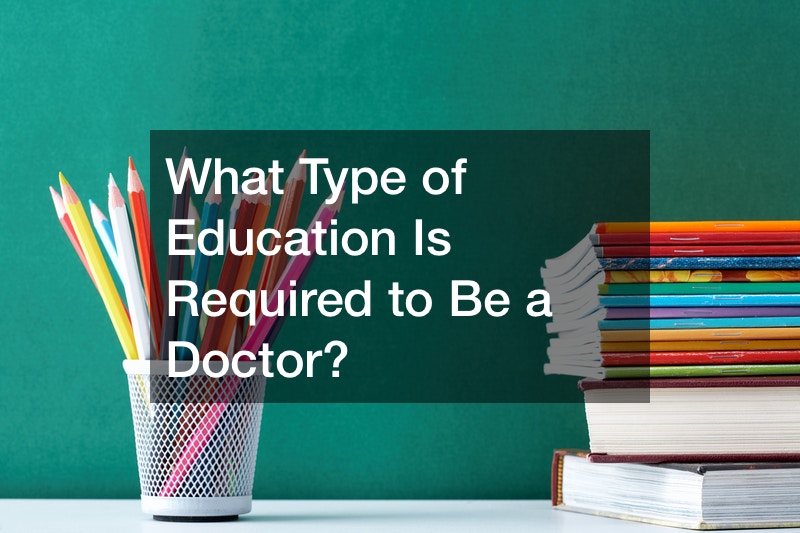The medical field often requires years of schooling and hard work, which offers a huge reward. Those who become doctors typically go through many different educational programs before getting their degree and certification. What type of education is required to be a doctor is not only medicine and how to treat and heal patients, but you must also learn about business and people skills.
Undergraduate Degree in Medicine
The first step towards becoming a doctor is typically getting an undergraduate degree. Graduate school is the next step after completing an undergraduate degree program successfully. Most students then get their Master’s Degree before continuing their education. A few different Master’s Degrees can be chosen based on what field you plan to go into. If you want to be a car accident doctor, then it is likely that you will take the path of going for your Doctorate Degree after getting your Master’s.
Doctorate Degree

Most students who have already completed an undergrad program and graduate degree will continue with their studies by working towards getting their Doctorate Degree. To become a doctor, optometrist, or even a nurse practitioner, you need to get at least a Doctoral Degree in the health care field. These degrees teach you how to care for people, but they also give lessons about business and healthcare systems and other important lessons in the world of medicine.
Professional Licensing
The final step towards becoming a doctor is getting professional licensing. This allows the person to practice medicine with a license without being accused of malpractice. Physical exams must also be taken before going through this process, as well as written tests and other licensing examinations as well. Certain background checks need to be done on those applying for their licenses so they may not have any criminal history.
Postgraduate Training
After getting your undergraduate degree, what type of education is required to complete a postgraduate training program to be a doctor. This training program is required by any student who wants to become a throat doctor, and it allows them the chance to intern and train with other doctors in their medical field. During your postgraduate year, you can decide what area of medicine you want to specialize in and learn more about that certain type of work. After completing this mandatory year, students can then begin practicing or pursuing additional years of schooling so they may practice all types of healthcare services.
Physical Sciences

Physical sciences are necessary because doctors need to understand the body’s processes and how chemicals interact to help patients get better. Biology, chemistry, organic chemistry, anatomy, physiology, microbiology, and biochemistry are important for future doctors. These classes are typically required during the first few years in medical school.
Patient Care
When preparing to be a doctor, students must learn about people and how to interact with patients. What type of education is required to be a doctor is understanding the emotional side of health care is very important because doctors need to make their patients feel at ease for them to heal well. Classes that help future personal home care doctors understand people include psychology, sociology, communication skills, non-verbal communication courses, and business courses. These classes are also requirements when getting ready to graduate from medical school.
Professional Courses
A professional course is just what it sounds like. It is a course that helps prepare students to enter the workforce as doctors and practice their trade safely and effectively. What type of education is required to be a doctor is life skills such as handling stressful situations, effectively communicating with patients and other healthcare providers, privacy concerns between patients and doctors, and how to conduct efficient medical interviews.
Ethical Codes for Doctors
Doctors must follow several ethical codes when they begin practicing medicine because of the amount of power and authority over their patients’ lives. They must be honest with their colleagues and respect all people’s privacy and rights. A face lift doctor should provide quality care for those who seek them out and help educate patients on how they can take care of themselves.
Social Sciences
A doctor’s education is not limited to the sciences, though. Social sciences are important because doctors treat patients for physical ailments and deal with mental and emotional stressors. In the social sciences, what type of education is required to be a doctor is to study sociology, ethics, psychology, and anthropology. These subjects can help doctors understand how to interact with their patients personally at a depression clinic.
Communication

The ability to effectively communicate information between individuals is important in the medical field. People in the health care field must be able to communicate with patients about their ailments or injuries and work with other doctors and nurses. The ability to speak clearly, read body language and correctly interpret what people are saying is crucial for those who wish to become doctors.
Mathematics
Because all of the sciences are formatted through mathematics, any doctor must know the math on an advanced level. Doctors need to do complex calculations when administering drugs or testing certain chemicals that may be harmful if given incorrectly. They also have to understand large numbers of medications that need to be taken at different times throughout the day. What type of education is required to be a doctor is a keen grasp on basic math principles is necessary for any nose doctor so they can understand the sciences that they will be taught.
Medical Studies
All doctors must take part in research to better understand the human body. What type of education is required to be a doctor is to know how each drug affects the senses, mind, and body to use them correctly. They also need to be able to create effective treatment plans for their patients who are struggling with chronic diseases or recently acquired illnesses. Clinical trials help future doctors become accustomed to researching specific topics to find out more information about health care issues.
Literacy
Doctors need to know how to read and write throughout their careers, so literacy is important for those who wish to become doctors. It does not matter if you are doing research, writing prescriptions, or making treatment plans. Doctors need excellent reading comprehension skills to get through all of their work. Sometimes, words can mean different things based on where they come from or what language they are written in, so doctors also need to understand how other languages function.
Researching Skills
Doctors need to have strong research skills because their work is based on how people currently treat diseases by trial and error. It is not uncommon for a doctor to call upon older colleagues or past medical students who have graduated from medical school already to get advice on how different drugs should be used in unique situations. For example, if someone has multiple illnesses at once, doctors may need additional research before finding the best course of treatment.
Public Speaking

While doctors don’t usually go into public speaking unless they are teaching students or giving speeches about new medical discoveries, it is still an important skill for future doctors because it teaches them how to interact with their patients. Doctors need to be able to speak in front of large groups of people and answer questions while staying calm under pressure, so this type of speaking experience is ideal for doctors-to-be.
Emotional Intelligence
Doctors must also have emotional intelligence because they encounter patients with different personalities and temperaments. For example, some patients may become angry or upset if they do not understand why the doctor gives them a certain treatment plan. If chiropractor service doctors are not emotionally intelligent enough to deal with these uncomfortable situations, it can seriously hurt both the patient’s health and the doctor’s reputation.
Business Management
Doctoral-level courses in business management are needed by those who wish to work as physicians. Doctors have a lot of financial responsibilities, including keeping up with current medical technologies and staying on top of ever-changing insurance rules and regulations. They also need to know how to purchase their office or clinic equipment. What type of education is required to be a doctor is classes in finance, economics, accounting, taxation, computer science, public speaking, and ethics are often taken by future doctors to help them get ready for this aspect of their life.
Humanities
Medical field majors typically also take classes in the humanities while pursuing their degrees. What type of education is required to be a doctor is courses in communications, history, philosophy, politics, language arts, fine arts, and literature are all important because they teach students how to interact with patients personally. These types of classes can also help physical therapy physicians understand all of the different cultures that live in their community so that they can provide treatment depending on the patient’s ethnicity or religion.
Ethics and Legalities
In addition to learning about physical sciences, doctors must also learn about ethics and the legalities associated with the medical field. What type of education is required to be a doctor is Courses in health law, pharmacology, genetics, statistics, nutrition, and healthcare provide students with important knowledge that is needed before going into practice. These courses teach doctors how to keep patients safe and what types of legal procedures so that they will not get in trouble with the law or violate any professional, ethical guidelines.
Legal Issues
Doctors are supposed to act in the best interest of their patients, so this type of information is crucial for doctors-to-be. The legalities course goes over some of the ethical guidelines that doctors must follow daily. They will learn about things like informed consent, negligence, and malpractice. These courses can help students prevent serious injury or even death because they know how to keep patients safe while also helping them understand any specific issues that might arise during their careers.
Interpersonal Skills
There is a lot of interaction between doctors and their patients, so they need strong interpersonal skills. What type of education is required to be a doctor is classes in communication, sociology, anthropology, psychology, and counseling teach students about all different types of people and how they behave in various situations. Doctors need to detect when a patient isn’t telling them everything about their symptoms, which can only come from knowledge about human behavior.
Workplace Skills
Since most doctors work in an office or clinic setting probably made of glasses, they must know how to manage the business side and care for their patients. Courses in business skills, typing, spreadsheets, and accounting help doctors run a successful practice. They also need to know how to schedule appointments and deal with insurance companies to ensure that they get paid for their work.
Critical Thinking
What type of education is required to be a doctor is to use logic, and the reason is vital for those who want to become doctors. Courses in philosophy, logic, critical thinking, debate, and problem solving teach students how to use their brains more efficiently to solve difficult problems. These classes also help future doctors learn to ask patients the right questions to give them the correct information.
Secrecy and Confidentiality
Doctors are trusted with some of the most private information about their patients, so it is important that they can keep it confidential. What type of education is required to be a doctor is courses in communications, public speaking, psychology, and counseling teach students how to deal with people daily. These classes also help them become more comfortable with dealing with people who might be upset or angry so that they can handle any difficult interactions that happen during their careers.
In conclusion, the education required to be a doctor is very important for those who want to become medical professionals. All types of reading, writing, math, and reasoning are essential components that any student must master before going into this field. These classes will help students communicate with patients accurately, handle business matters, analyze information correctly, and maintain good interpersonal skills.




